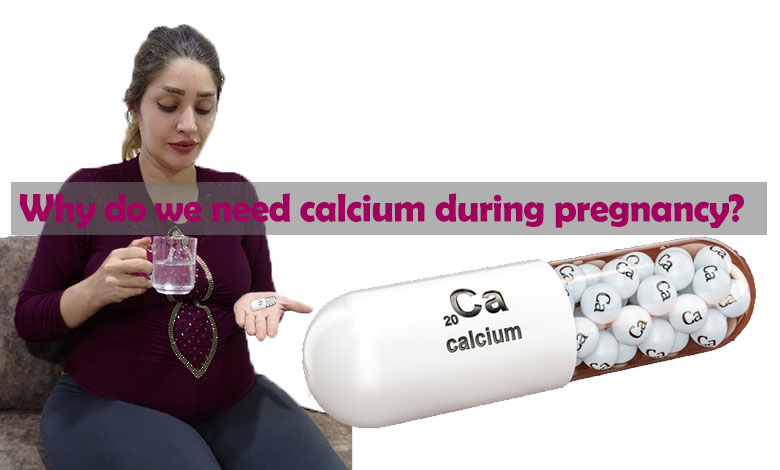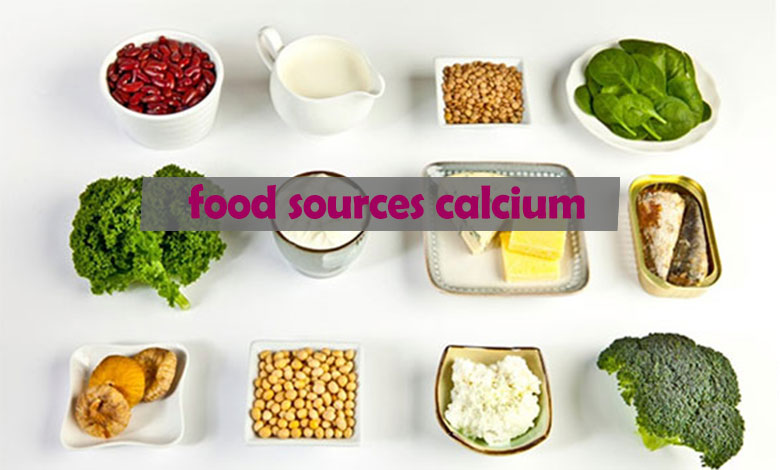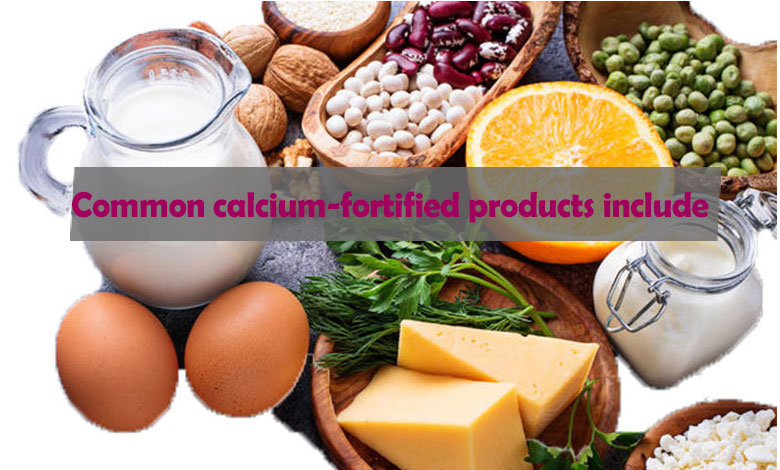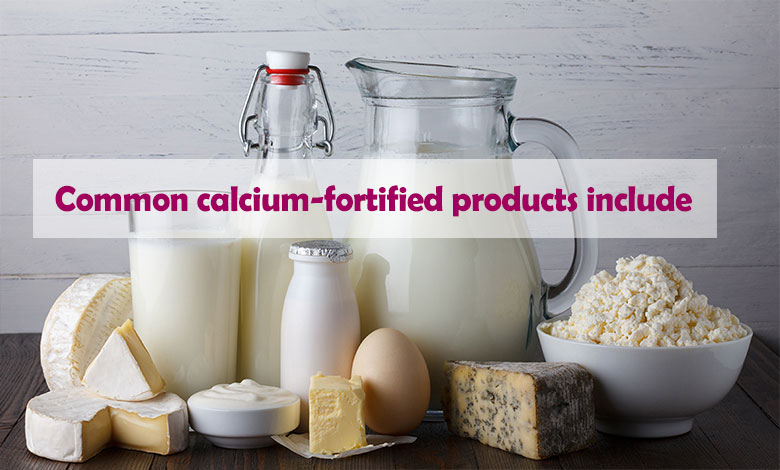Why do we need calcium during pregnancy?

Calcium is one of the key minerals you need during pregnancy; Along with other vitamins and minerals, it is supplied by your body to your baby to help develop vital structures such as the skeleton.
Needs vary by age, and too much or too little calcium can cause complications. Read on to find out how much calcium you need, why it’s important, and how to make sure you’re getting enough.
Related article: vitamins in pregnancy
Calcium needs vary depending on age, even during pregnancy:
The American College of Obstetricians and Gynecologists (ACOG) recommends that pregnant and lactating mothers 19 years and older consume 1000 mg of calcium daily.
Teenage mothers need a little more. They need enough to maintain their bones and store calcium in their bodies while supporting their baby’s growth. Therefore, experts recommend that pregnant teens 18 years and younger get at least 1,300 milligrams of calcium per day.
Importance Calcium
Calcium is an important nutrient for the body. During pregnancy, you need more calcium for your health and for the health and development of the baby growing inside you.
for your child
Your growing baby needs calcium to form bones and teeth. After all, they are building a complete skeleton. Calcium is also an important nutrient for your baby’s heart, muscles, nerves, and hormones.
for you
During pregnancy, you give your baby the calcium it needs, so when you get the recommended amount of calcium each day, you’re taking care of yourself and your baby. If you don’t get enough, you may experience some complications.
Regardless, of whether you get enough or not, your body will still give your baby calcium. So if you don’t replace what you give, you could end up with weakened bones and an increased risk of osteoporosis.
Complications Calcium
Complications may be due to both high and high kicks. Fortunately, they are easily preventable.
Very little calcium
If you don’t get exactly the recommended amount of calcium each day, you probably won’t experience any major complications during pregnancy.
Calcium deficiency is likely to cause complications if it is due to a health problem such as kidney problems, surgery, or the need to take certain medications.
Not getting enough calcium can lead to the following :
- High blood pressure during pregnancy
- premature birth
- Low birth weight
- Numbness and tingling in the fingers
- The slow growth of the child
- The child does not get enough calcium in the bones
- Heart problems
- Muscle and leg cramps
- poor appetite
- In rare cases, increased risk of bone fractures.
In severe and rare cases, low calcium can cause death. While, understandably, many of these side effects are a cause for concern, remember that you’ll likely get some calcium even without trying. In addition, you must store enough in your bones to be able to support your growing child.
If you have any of the listed health problems that could possibly lead to a calcium deficiency, your doctor will be fully aware and will work closely with you to prevent any complications.
A lot of calcium
It’s rare to get a lot of calcium from the foods you eat. If you use supplements, you will likely get too much calcium.
It’s important to understand which nutrients and how much of each nutrient is found in the prenatal vitamins and other supplements you take. You may add without even knowing it.
It’s always best to talk to your doctor about any vitamins you’re taking or considering, so you get what you need without taking too much.
If you’re 19 or older, you don’t want to consume more than 2,500 milligrams of calcium per day, and if you’re 18 or older, you don’t want to consume more than 3,000 milligrams per day.
Eating too much calcium can cause:
- constipation
- Kindy stones
- You may have difficulty absorbing other minerals such as iron and zinc.
- Irregular heart rhythm
- Low calcium content in the child’s body.
- Sources
Your body doesn’t produce calcium, so you need to get it through foods, fortified products, and supplements.
food sources calcium
Four servings of fortified milk or other fortified dairy products will meet your daily calcium requirement by providing about 1,200 milligrams (about 300 milligrams per serving).
A glass of fortified orange juice has the same amount of about 300 milligrams per serving. Other foods such as green vegetables, nuts, and beans have slightly less (about 100 mg per serving).
Make sure any dairy products you eat are pasteurized and talk to your doctor about the best type of milk and dairy products. Low-fat and skim milk contain the calcium and nutrients of whole milk without the added fat and calories.

In any case, your doctor will advise you on the best choice based on whether you are underweight, within the recommended weight range, or overweight.
The serving sizes and amounts of calcium listed below are averages provided by the USDA.
Dairy products that are an excellent source of calcium include:
- Milk (1 cup, whole, 276 mg calcium).
- Cheese (2 slices or 1.5 ounces, 307 mg calcium)
- Yogurt (8 ounces, plain, low fat, 415 mg calcium)
- Kafr (1 cup, low fat, calcium 316 mg)
Other foods rich in calcium are:
- collard greens (1 cup cooked, 268 mg calcium)
- Kale (1 cup cooked, 177 mg calcium)
- Broccoli (1 cup cooked, 64 mg calcium)
- Bok Choi (1 cup cooked, 158 mg calcium)
- Soybeans (1 cup cooked, 184 mg calcium)
- Baked beans (1 cup cooked, 160 mg calcium)
- Almonds (1 cup, roasted, salted, 370 mg calcium)
- Salmon (6 ounces, 15 mg calcium)
Keep in mind that although fish is considered healthy during pregnancy, its consumption is very dangerous. In general, pregnant women are advised to avoid larger fish that have higher levels of mercury, such as swordfish and king mackerel.
Common calcium-fortified products include:
- English muffin (1 cookie, 100 mg calcium)
- Waffles (2 pieces, 200 mg of calcium)
- Calcium-fortified orange juice (1 cup, 349 mg calcium)
- Cereal (1 cup, 100-1000 mg calcium)
- Be sure to check the product packaging for labeling that indicates it is fortified with calcium.

Diet tips
If you enjoy dairy products and can easily consume four servings a day (8 ounces per serving), then you should have no problem meeting your daily goals. But, if you’re not a fan of dairy, there are preparation methods you might like more than drinking a cup of milk or eating a cup of yogurt.
Here are some simple options to help you get what you need:
- eat cereal in the morning. Enjoying a bowl of cold cereal or warm cereal/oatmeal made with milk is a great way to start the day.
- Make it a latte. Add some milk to your breakfast coffee or tea.
- Top it with cheese. Add some cheese to your salads, soups, and other dishes.
- Make it creamy. Add some milk or steamed milk to your recipes and make creamy soups, sauces, mashed potatoes, mashed potatoes, mac and cheese, and other delicious dishes.
- Substitute some dairy in your cooking. Use instead of water to cook noodles, pasta, rice, oatmeal, or other foods.
- Change your regular order. Instead of soda or other beverages, have a glass of milk or chocolate with lunch or dinner. In colder climates, enjoy hot cocoa made with milk instead of water. Add it as a snack. Stock the fridge with cubes of sliced cheese, string cheese, or flavored yogurt so they’re ready and easy when you need a snack.
- Have a treat. For dessert, enjoy a bowl of ice cream or frozen yogurt, a small milkshake, a yogurt and fruit smoothie, or some pudding.
Vegetarian diets
Vegetarian and vegan diets can be very healthy. But if you’re following one, you need to know a little about nutrition to make sure you’re getting all the vitamins your body needs. Getting proper nutrition is even more important during pregnancy.
There are different types of vegetarian diets. The amount of calcium you get and how much it is absorbed depends on what you eat. If you follow a lacto-ova vegetarian diet, you can eat eggs, milk, and cheese. Therefore, based on this plan, you should be able to get enough calcium daily.
If you follow a vegetarian or vegan diet, meeting the daily recommendations for calcium can be challenging.
In a vegan diet, you do not consume milk or dairy products. Also, some plants interfere with the absorption of calcium in the body. This doesn’t mean you can’t get enough calcium in your diet if you’re vegan, it just means you need to know the right foods to choose from.
Vegan sources of calcium include:
- Dark green leafy vegetables
- Beans (1 cup boiled, 126 mg calcium)
- Almonds (1 cup, 370 mg calcium)
- Sesame seeds (1 cup, 1400 mg calcium)
- Tahini (2 grams, 310 mg calcium)
- Raisins (1/4 cup, 20 mg calcium)
Commonly enriched products are:
- Tofu, firm, with calcium sulfate (1/2 cup, 253 mg calcium)
- Soy milk (1 cup, 299 mg calcium)
- Rice milk (1 cup, 283 mg of calcium )
If you are having trouble getting enough calcium through diet alone, you should talk to your doctor about a vegetarian or vegan calcium supplement.
lactose intolerance
If you do not tolerate dairy well, you can still get the calcium you need through other foods, non-dairy options, and rich products.
If you are lactose intolerant, you can try the following:
- Lactose-free milk and cheese fortified with calcium
- Dairy products with reduced lactose
- Lactase tablets that you take before consuming dairy products
If you just don’t like the taste of milk, you can:
- Try cheese, yogurt, or other dairy products
- Drink fortified orange juice
- Hide the taste of milk using shakes, puddings, and other recipes
supplement
Prenatal vitamins, along with other vitamin and mineral supplements your doctor recommends, are a great way to fill in any nutritional gaps.
Remember that supplements are only meant to add to a healthy diet, not replace them.
You should still do your best to eat right and get the nutrition you need every day.
When should they be taken?
If you’re not getting what you need in your daily diet, you may need to take a supplement, especially if you’re having trouble getting enough calcium for a reason:
- Severe nausea and vomiting
- lactose intolerance
- A diet that does not include dairy products
- Health conditions such as IBS or celiac disease

Supplements are also usually recommended if you are at risk for preeclampsia or gestational hypertension.
Be sure to talk to your doctor before starting any new supplement. While you want to make sure you have enough calcium, you also have to make sure you don’t have too much.
Tell your doctor if you have already taken an over–the–counter prenatal supplement of vitamin, calcium, or anti-acid. Your doctor will advise you on the safest supplements or give you a prescription for your needs.
Types of calcium supplements
Calcium supplements include:
- Prenatal vitamins: Although they usually contain a small amount of calcium, it is not enough to meet the daily requirement. You still need to get calcium through your diet. Different brands have different amounts of vitamins and minerals, so check the label and talk to your doctor.
- Calcium citrate: If you have trouble getting enough calcium or are prone to high blood pressure during pregnancy, your doctor may recommend calcium citrate supplements.
- Calcium Carbonate: Calcium carbonate is the active ingredient in some antacids such as Tums. If you use Tums for heartburn, tell your doctor and follow his advice on how to take it. Depending on how many times a day you take Toms and your overall diet, you may be getting too much calcium.
Potential side effects
Aside from the potential side effects of a high calcium intake, calcium supplements can cause gas, bloating, and general constipation. If you have these side effects, it may be worth switching brands, changing your diet to reduce gas-producing foods, or finding ways to reduce these side effects.
Vitamin D
Vitamin D is an essential vitamin for many reasons. One of the things it does is help absorb calcium in the body. Vitamin D and calcium work hand-in-hand to strengthen bones.
During pregnancy, experts recommend consuming 600 international units of vitamin D each day. Your body uses sunlight to make vitamin D naturally. But you can also get vitamin D from certain foods or supplements.
You can get a daily requirement to obtain vitamin D:
- Spend some time in the sun. Sunlight converts the chemist into your skin in vitamin D.
- Consume fortified products. Many calcium-rich foods are also fortified with vitamin D, such as milk, orange juice, cereal, yogurt, and eggs.
- Take your prenatal vitamin. Most prenatal vitamins contain vitamin D. but be sure to read the label and consult your doctor.
- Ask about vitamin C supplementation. You should talk to your doctor before taking any additional supplements. Getting enough vitamin D is important, but too much can be dangerous.
How does caffeine affect calcium?
Caffeine can act as a diuretic and make you urinate more. Increased urination can cause some of the calcium to be removed from the body. If you fall within the recommended guidelines for caffeine during pregnancy, this harm should be minimal.
Conclusion
In conclusion, calcium is an essential mineral that plays a crucial role in a variety of bodily functions, including bone health, nerve and muscle function, and blood clotting. During pregnancy, calcium needs to increase to support the development of the fetus’s bones and teeth, as well as to ensure the mother’s calcium levels remain stable.
Adequate calcium intake during pregnancy can also reduce the risk of complications such as pre-eclampsia and preterm birth. Therefore, it is important for pregnant women to consume sufficient amounts of calcium through a balanced diet or supplements, as recommended by their healthcare provider.
